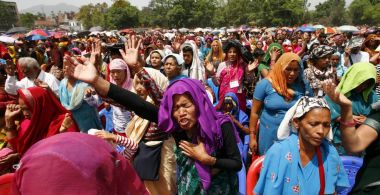Christianity facing threat of being rendered illegal under Nepal's new constitution

Christians may soon be prohibited from participating in church services and other religious activities in Nepal after the predominantly Hindu nation adopted a new Constitution on Monday.
In an effort to stabilise a country that was wracked by civil war in 2006, killing some 17,000 people, the Nepalese government crafted the country's first post-monarchy constitution, which contains provisions that could eventually render all Christian activity in the country illegal.
In its report published on Aug. 7, World Watch Monitor said Nepal's amended charter actually contains provisions to address secularism, which can pave the way for an "anti-conversion clause" to be written in the penal code.
"Article 31(3) states that 'any act to convert another person from one religion to another, or any act or behaviour to undermine or jeopardise the religion of another [will be] punishable by law,'" World Watch Monitor reported.
"Christians fear this will pave the way for an 'anti-conversion clause' to be written into the penal code, which could result in prison sentences or hefty fines for "offenders," it added.
The World Watch Monitor explained that while the amendments relate to all religions, the new constitution did not contain any specification as to what constitutes an "act to convert."
This, it said, holding church services accessible to all, or even simply organising events to aid the disadvantaged could be interpreted as "evangelistic" and, therefore, punishable by law.
"The Church has never been recognised as an official religious institution within Nepal, and Nepali Christians complain that they have suffered inequality and persecution for decades," the World Watch Monitor said.
"Christians had hoped that a new constitution enshrined by the new secular democracy would guarantee equal rights and religious freedom for all," it added.
Nepal used to be the only Hindu monarchy in the world until a civil war broke out between the Maoist rebels and the government in 2006, prompting it to abandon the 239-year-old monarchy and embrace democracy and secularism in 2008.
But the country's transition to secular democracy couldn't be completed since its politicians had missed several deadlines for it to finally replace its interim constitution, protracting the discussion of the new one to seven years.
An overwhelming public demand to return to the former status of a Hindu nation eventually pressured Nepali politicians to use the term "Hindu state" instead of "secular" in the new constitution, which took effect on Aug. 10.
Hindu activists wanted the Himalayan government to abandon secularism, which guarantees religious freedom, which spurs leaders of other religions like Christianity and Islam to try and convert Hindus to their faith.
"Our religion is facing a threat from the Christians who are proselytising. We want to stop it," Eternal Hindu Front group head Madhav Bhattarai said in a protest held on Aug. 5, according to Reuters.
Over 81 percent of the 28 million total population in Nepal are Hindus, 9 percent are Buddhists, 4.3 percent Muslims, and less than 2 percent Christians.
C. B. Gahatraj of the Federation of National Christian Nepal, said the number of Christians in the Himalayan nation is underestimated, adding that people are not being forced to convert to other religions.
"Hindu groups may have been alarmed by the fact that people who were praying quietly earlier are doing so openly now. All citizens must be allowed to practice the religion of their choice freely," Gahatraj said.











